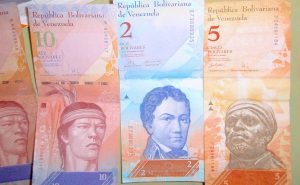Venezuela’s Inflation: The Price of Socialism

By Paula Hernandez
A mother of two waits in line for six hours to buy rice and flour she desperately needs to feed her family. That is, if there’s even any left by the time she makes it to the front. She and her two sons are severely malnourished and getting sicker every day. Toilet paper, diapers and cooking oil are nowhere to be found; the black market “bachaqueros” buy up the cheap, but limited, government subsidized items and resell them at a much higher price.
This is not a faraway, imaginary anecdote. For millions of Venezuelans, struggling to meet their basic needs, this is a harsh daily reality. Venezuela’s currency, the bolivar, has “lost 98 percent of its value against the dollar in the past year” and economists predict that the situation will continue to deteriorate. Inflation has been following an upward trend since 2014, and I’d argue that Venezuela has been on its way to crisis since 1958, when Rómulo Betancourt actively worked to nationalize Venezuela’s oil industry during his presidency.
This socialization was only made worse in 1998, when Hugo Chávez was elected president by promising an end to corruption and an end to poverty. During his 14-year reign, Chávez worked to eliminate the government’s checks and balances. He also further nationalized the oil, agricultural and financial industries. It was only the pre-2014 high oil prices and production that allowed Venezuela to maintain the illusion of prosperity and stability.
The current president Nicolás Maduro, has upheld Chávez’s totalitarian policies and further implemented policies that have increased government control and essentially made him a dictator. Maduro is almost universally despised in Venezuela, and has maintained his power amidst massive and violent protests only through changes to the constitution and military force. The common thread between these men? Government control. Each one of their socialist agendas has left Venezuela vulnerable. Although there was a time that this vulnerability was masked by the global oil market, the policies that each of these individuals put in place have made it possible for Venezuela to sink as low as it has today. Socialism does not work. Venezuela is just one of many examples of how detrimental socialist systems can be because of how clear “the US media of smearing Venezuela’s socialist president” (according to Sean Penn and others) in 2010 was justified.
The fact of the matter is that large, centralized governments are consistently less effective at redistributing wealth than the individuals that the government overlooks. In addition, being a government approved form of theft is not conducive to furthering economic growth. Inevitably, socialist systems collapse as industry competition dies out, creating economic stagnation and the government no longer has the funds to support its population. The solutions to Venezuela’s crisis are complex and imperfect. Most of what has been proposed is a Band-Aid covering a bullet wound and that risk is making the crisis worse and/or increase government involvement in private industry. However, there are three things that must happen to alleviate the situation.
First, the government needs to stop controlling prices. Although these controls are what make it possible for many people to afford food, the actions of bachaqueros and the limited supplies are creating a vacuum, where the government loses revenue. These “low” prices are an artificial government creation and contribute to the lack of supplies available at stores.
Secondly, the Venezuelan government needs to remove legislation that regulates imports and exports. Relations between the U.S. and Venezuela have been growing more distant since Hugo Chávez’s presidency. His public villanization of the U.S. is largely to blame for the nature of this relation. It can remove currency exchange requirements and/or the bureaucratic checks placed on a variety of products before they are approved to import.
Lastly, Venezuela needs to stop printing more Bolivares. Printing more money does not add to the economy, but rather encourages an increase in prices. Considering, that historically this method has not worked and that Maduro is replacing old 100 Bolivar bills with bills worth between 500 and 20,000 bolivares to try and meet the demand of the already high prices did not improve the situation.
All this being said, these solutions all depend on the morality of the men in government who have repeatedly and obviously shown signs of being not only corrupt, but nefarious. I find it unlikely that Venezuela will return to its previous illusory glory, but solving this situation is literally a matter of life and death. The crisis in Venezuela is nothing less than a crime against human dignity. The poor quality of life in what was once one of the richest oil-countries in the world is not something to take lightly. While many deny the role that the country’s socialist government has played in the current state of affairs, I’d urge you to consider the struggles the fathers, mothers and children of Venezuela face the next time someone talks about the “benefits” or the “morality” of socialism.
Paula Hernandez Garaycoa, FCRH ’21, is an English major from Miami, Florida.









































































































































































































